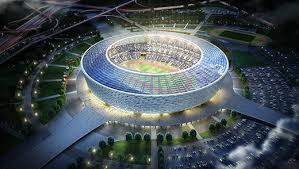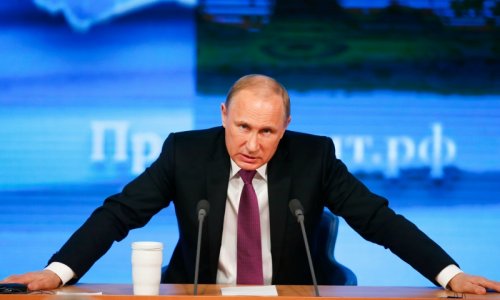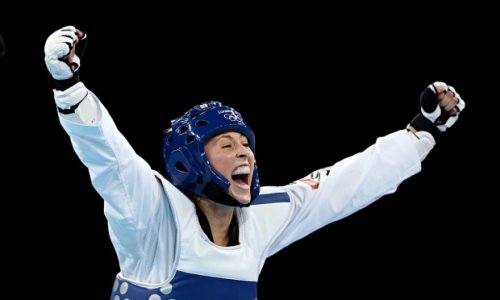By Jack Farchy
High quality global journalism requires investment. Please share this article with others using the link below, do not cut & paste the article. See our Ts&Cs and Copyright Policy for more detail. Email [email protected] to buy additional rights.
Baku’s national stadium is a hive of activity. In every direction, teams of workers are rushing to put the finishing touches to the 68,000-seat arena in time for the opening ceremony of the inaugural European Games in June.
One group is laying the running track; another is painting the stands; yet another team is laying kerbs and planting trees in the little patches of grass outside the stadium.
High quality global journalism requires investment. Please share this article with others using the link below, do not cut & paste the article. See our Ts&Cs and Copyright Policy for more detail. Email [email protected] to buy additional rights.
The mad dash to finish everything in time for the opening ceremony — a common theme of big sporting events — has acquired greater urgency in Baku’s case as the city has had less than three years to prepare, compared to the usual seven-year lead time.
"It’s a remarkably short window for a project this size,” says Ron Cameron, the venue manager for the stadium. "I had my doubts when I got here, but they’ve got it all done.”
Azerbaijan is no stranger to mega projects. But the Baku Games, which will run for just over two weeks from June 12, are perhaps its most grandiose project yet.
The government sees the Games as the first step in a broader strategy to use sport to promote Azerbaijan’s "soft power” on the world stage. They are the first big instalment in a series of flagship sporting events that the country plans to host, from a Formula 1 Grand Prix next year, to the Islamic Solidarity Games in 2017, to several matches in the Euro 2020 football championship. There is also speculation of a bid for the 2024 Olympics.
"This is the great coming-out party of Azerbaijan,” says Simon Clegg, chief operating officer of the Games.
It is an expensive party, though, at a time when Azerbaijan’s government revenues are being squeezed by the slide in oil prices. The official budget of the Games this year is 950m manat, according to a statement by the sports minister ahead of February’s devaluation, but economists estimate that the cost, including the construction of stadiums and upgrading of infrastructure, to be in the range of $3bn-$7bn. This year alone, spending linked to the Games is budgeted to account for a quarter of the government’s entire capital expenditures.
"Everyone is feeling it here in terms of funding that’s available. But the government has been very supportive in terms of ringfencing funding for the Games,” says Mr Clegg, noting that the Games’s organising committee has made a "modest” budget reduction in response to the tougher economic climate.
Even with reductions, the Games are still a huge logistical undertaking, featuring 20 sports, 6,076 athletes, and 759 medals.
A brainchild of the International Olympic Committee, they were designed as a counterpart — the "fifth Olympic ring” — to other continental Olympic competitions held in the Americas, Asia, Africa and the Pacific.
But, as the first European Games, success is not a given. "We’ve had to go to the commercial marketplace, be it sponsors or broadcasters with a blank piece of paper and a bunch of promises. There’s no track record,” says Mr Clegg. "Revenues from those sources are not what we might aspire for them to be.”
Another challenge has been to attract the continent’s best athletes. Here, the organisers were stymied by the relatively late decision to hold the games in 2015 — the European Athletics Team Championships, an established fixture in the calendar, were already scheduled to be held in Moscow this June.
While the Baku Games will have an athletics competition, it will not feature Europe’s best teams but instead the third division, including the national team of Azerbaijan.
Beyond athletics, though, the organisers are confident that the continent’s top athletes will make the trip to Baku.
"There’s only ever one first European Games champion,” says Pierce O’Callaghan, director of sport at the Baku Games. As important, the organisers have succeeded in making 11 of the events qualifying competitions for the 2016 Olympics in Rio.
"That means athletes will be very motivated to come,” says Mr O’Callaghan.
A more difficult question is whether the Games will achieve the desired promotional boost for Azerbaijan in the world. They are likely to become a lightning rod for critics of the country’s deteriorating human rights record, with several of the country’s most prominent activists languishing in jail.
In a letter to the FT from prison, Leyla Yunus, one of the country’s leading activists, said that holding the Games in Baku would "contradict the very spirit of the Olympics”.
Mr Clegg concedes that the European Games do not yet have a sufficiently high profile to attract large numbers of foreign tourists.
"Realistically, many of the ticket sales will come from [the] domestic public,” he says.
Among that public, though, some have already caught the Olympic bug. The organising committee has had 29,000 applications to volunteer during the Games, and has a thriving graduate scheme.
The enthusiasm of the graduate trainees is contagious. "When Baku was chosen to host the Games in 2012, I was really proud,” says Turgut Qambarov, a 21-year-old member of the Games’s graduate scheme, who says with pride that he is one of only two local staff working on the timekeeping and results team.
When I wake up in the morning I think: I am doing results,” he beams.
www.ft.com/cms/s/0/b79cb2e2-be99-11e4-8036-00144feab7de.html#axzz3U9qaSkO6
ANN.Az
Follow us !








